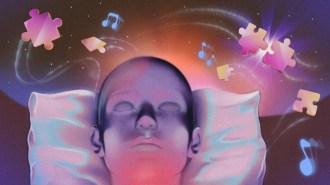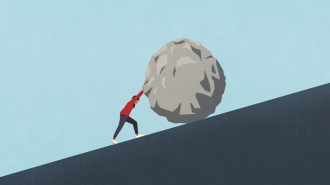Stage set early for success, or failure
Good self-management by age 3 predicts adult health and wealth
Young kids lacking self-management skills are way more than annoying. They’re more likely to be big-time losers in the game of life, a new study finds.
Low levels of conscientiousness, perseverance and other elements of self-control in youngsters as young as age 3 herald high rates of physical health problems, substance abuse, financial woes, criminal arrests and single parenthood by age 32, says an international team led by psychologists Terrie Moffitt and Avshalom Caspi of Duke University in Durham, N.C.
Increasing self-control difficulties among children herald progressively greater numbers and seriousness of these adult troubles, the scientists report online January 24 in the Proceedings of the National Academy of Sciences.
Intelligence, as measured by IQ tests, has long held sway as the prime mental influence on health and achievement. But self-control’s close link to adult health and accomplishment remained after researchers accounted for children’s IQ scores and family income. “Self-control and intelligence are both valuable for life success, but after years of effort, IQ has proven difficult to change through interventions,” Moffitt says.
For as-yet-unknown reasons, 7 percent of youngsters in the long-term study developed notably better self-control as they got older. Members of this group displayed better health, made more money and had fewer criminal run-ins as adults than would have been predicted by their self-control levels as young children.
Moffitt and Caspi say that their findings offer the first evidence that even small improvements in children’s self-control have the potential to reduce health care costs, cut welfare dependency and lower crime rates.
Home and school programs designed to strengthen self-management show promise in early trials, Moffitt holds. Researchers need to confirm the effectiveness of these approaches so they can be adapted for widespread use, in his view.
Interventions exist that parents and teachers can use to strengthen children’s self-control, remarks criminologist Alex Piquero of Florida State University in Tallahassee. A 2010 research review led by Piquero concluded that programs grounded in behavioral rewards, training in coping skills and role-playing stimulated by videotaped situations worked best in boosting kids’ self-control.
In the new investigation about 1,000 children born between April 1972 and March 1973 in Dunedin, New Zealand were regularly assessed up to age 32. Each child’s ability to tolerate frustration, persist in reaching goals and otherwise manage his or her life was rated by parents, teachers, experimenters and the children themselves.
Kiwi kids who scored low in self-control were the most likely to make life-changing mistakes as teens, including starting to smoke cigarettes, becoming parents of unplanned babies and dropping out of school. Even if they graduated high school as nonsmokers with no children, self-control-challenged children still encountered more health and personal difficulties as adults than their peers who started out with high self-control.
Prominent physical health problems in the New Zealand sample included gum disease, sexually transmitted infection, inflammation, overweight, high cholesterol and elevated blood pressure.
Financial problems centered on difficulties with saving money, planning for retirement, making credit card payments and avoiding bankruptcy.
A second analysis conducted by Moffitt and Caspi’s group found that among 500 pairs of fraternal twins in England and Wales, the twin with lower self-control at age 5 more often smoked cigarettes, did poorly in school and engaged in delinquent acts at age 12. This finding underscores the influence of self-control on children’s development, apart from general effects of one’s family background, Moffitt says.







